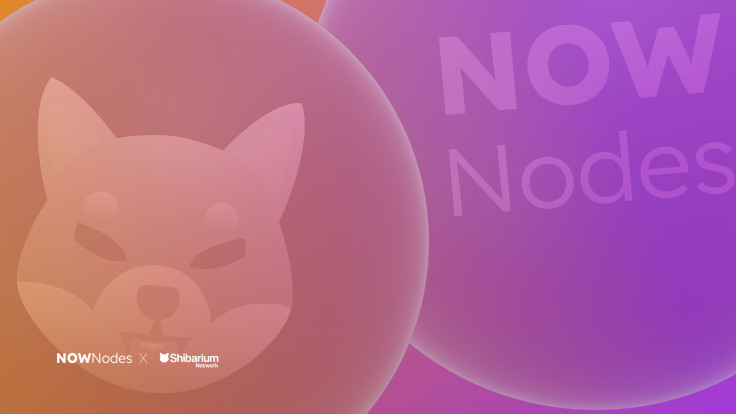Exclusive: NOWNodes' Latest Milestone Highlights Developers' Interest To Build On Shibarium

KEY POINTS
- NOWNodes debuted its RPC full node on Shibarium last week
- NOWNodes processed more than seven million RPC requests within a week
- The RPC full node launch is a promising initiative that aligns with what Kusama said about adoption and burning SHIB of tokens
Remote Procedure Call (RPC) full nodes provider NOWNodes hit a new milestone just a week after it debuted on Shiba Ecosystem's Shibarium, underlining the amount of interest developers have in building decentralised apps on the newest layer-2 scalability solution in the industry.
Shibarium previously made a new record when NOWNodes rolled out its RPC full node. Just seven days later, the RPC provider announced it has processed more than seven million requests from individuals, enthusiasts and developers, who wanted to build apps in one of the fastest-growing layer-2 solutions in the cryptocurrency industry.
But, what is RPC full node and why is it crucial for Shibarium, the Shib Army and the Shiba ecosystem?
"RPC Full Node is used to access blockchain data, enable coins' and tokens' transactions and integrations. In Shibarium's case, it's now easier and more accessible to build on it and create new use cases: dApps, smart contracts, bridges, NFT Marketplaces, etc," Ian Lapinskii - DevRel & Partnerships at NOWNodes told International Business Times in an exclusive interview.
"RPC Full Node is a development tool that we've deployed (built and made available for everyone). Now it's up to crypto businesses and developers to deploy on top of our Shibarium Node," he added.
As a development tool, the RPC Full Node is designed to help developers and other crypto enterprises create and build on Shibarium without any limits. Essentially, it offers developers shared access without any rate limits, allowing them to develop on Shibarium seamlessly.
NOWNodes offers RPC Endpoint access through an API key with reinforced security including four layers of protection and deployed backups.
While Shibarium has been running on public RPCs for several weeks already, Lapinskii, who works directly with developers and blockchain networks, underlined the pros and cons of using public and private RPCs.
"There is a lot you can do with public RPCs, Shibarium has been running on these for a few weeks already. As a dev, you send transactions to these public RPCs and get their responses, and that's how you build a dApp, deploy tokens and many others," he told IBT.
"Now, public RPCs are very limited because everyone is using them, and they may also lack a few capabilities very specific to your app. Big crypto enterprises would ideally use a Private RPC they can run only for them. This way you can have faster block verification, you can validate your own blocks without relying on other nodes. You can run your private RPC yourself at home on your computer if you want, or you can use RPC providers like NOWNodes," he explained.

NOWNodes also shared that many of its enterprise partners are interested in using the Shibarium RPC Full Node and noted that the team is just waiting for token migration. Additionally, the team revealed that among the top use cases on Shibarium using NOWNodes are decentralized exchanges (DEXs) and Bridges.
"It's always amazing to see new networks onboarding at NOWNodes, and the Shibarium L2 solution is something that our partners have been waiting for. Excited for what comes next," NOWNodes content and SEO lead and partnerships Anna Bezmen told IBT.
NOWNodes' RPC Full Node launch in Shibarium is a promising initiative that aligns with what Shytoshi Kusama, the pseudonymous lead developer of the Shiba Ecosystem, previously said in terms of adoption and burning SHIB tokens.
At the time, some members of the community were asking about the SHIB burning feature on Shibarium. Kusama highlighted that while the team has been working to roll out the SHIB burn feature in Shibarium, they underlined that beyond the burning activity, the community "absolutely MUST increase adoption," noting that "burns will not be the end-all, be-all."
So to confirm that ADOPTION is the right way🌝$SHIB Burns x Shytoshi answered pic.twitter.com/BizkLZ0V83
— 𝐋𝐔𝐂𝐈𝐄 | ✨Shibarium✨ (@LucieSHIB) September 4, 2023
More projects on Shibarium mean increased adoption and for every transaction these projects process, part of the gas fee will be burned.
The burning mechanism in Shibarium operates as users make transactions on the platform and pay for gas fees using Bone ShibaSwap (BONE) tokens. The gas fee is divided into a base fee, which is locked in the Shibarium contract, and the rest goes to the validators. Of the base fee, 70% is converted into SHIB and sent to dead wallets (burned), while 30% is reserved for developers to maintain the layer-2 scalability solution.
© Copyright IBTimes 2024. All rights reserved.






















